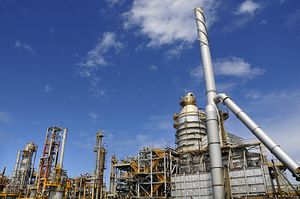Venezuela holds the largest proven oil reserves in the world. For the past few months the country has faced turmoil because its population is upset with the government’s inefficiency. In the 1990s, the capital of Caracas was considered one of the most promising cities in South America; today it is in chaos, with one of the highest homicide rates in the world. This drastic change is due to the government’s inability to keep crime down, fight corruption, and, most of all, supply basic necessities like food and security.
Since February young Venezuelans have taken to the streets to protest the government’s use of repression and violence. In responding to the protests, the government unleashed its police (PNB) and special forces (SEBIN). The violent crackdown left 42 people dead and hundreds injured, dozens of human rights abuses ranging from rape to excessive beatings, and political persecution.
As a country with no extensive arms industry, Venezuela gets its weapons from Russia, China, and Spain. One of the most emblematic symbols of the government’s repression is the VN4, a 4×4 light tactical armored vehicle supplied by China and equipped with water cannons, smoke grenade launchers, and a turret.
However, China’s interest lies beyond weapons sales. It sees in Venezuela a strategic economic and political partner, in a region controlled by the United States. That makes China all the more concerned about Venezuela’s descent into turmoil.
Oil and Natural Resources
China’s main interest in Latin America lies in the continent’s abundant natural resources, which China needs to continue fueling the rapid growth that has made it the world’s second largest economy.
China’s desire to be less dependent on Middle Eastern oil has led it to increased connection with Venezuela, which is why relations between both countries have thrived since the beginning of the millennium. As China keeps growing apace, it will continue to need supplies to support its economic growth. China’s rationale for working so closely with Venezuela has to do with Venezuela being the world’s largest proven holder of petroleum. As a country that depends on oil, China sees the instability of the Middle East as a threat in the long run, just as the U.S. sees its dependency on foreign oil a national concern.
Chinese stakes in Venezuelan oil companies reflects this growing interest. Chavez’s plan to break away from U.S. dependency and diversify oil exports was a boon for Beijing. China established its presence in the Venezuelan oil sector with the Venezuelan-Chinese Joint Committee, and PetroChina signed joint venture agreement with PDVSA, the national petroleum company of Venezuela, in 2011 to start building a refinery.
More recently, in 2013, China and Venezuela announced $28 billion in deals, ahead of a state visit to China by Venezuelan President Nicolás Maduro.
All of this reduces Venezuela’s dependence on the U.S. market, which at any rate is being flooded with domestic shale oil. That leaves more oil for China, which it takes in payment for the extensive loans it has extended to the troubled country.
As for the turmoil in Venezuela, a continuing legacy of the Chavez era, Beijing has stuck to its foreign policy script of non-intervention. But as China’s presence in the region grows, Venezuelan stability becomes more important. The benefits that China has gained from the Bolivarian government, not only under Chavez but also now under Maduro, show its privileged status. With instability on the rise, China can only worry about the future of its close regional ally, and its economic, political, and cultural investment.

































